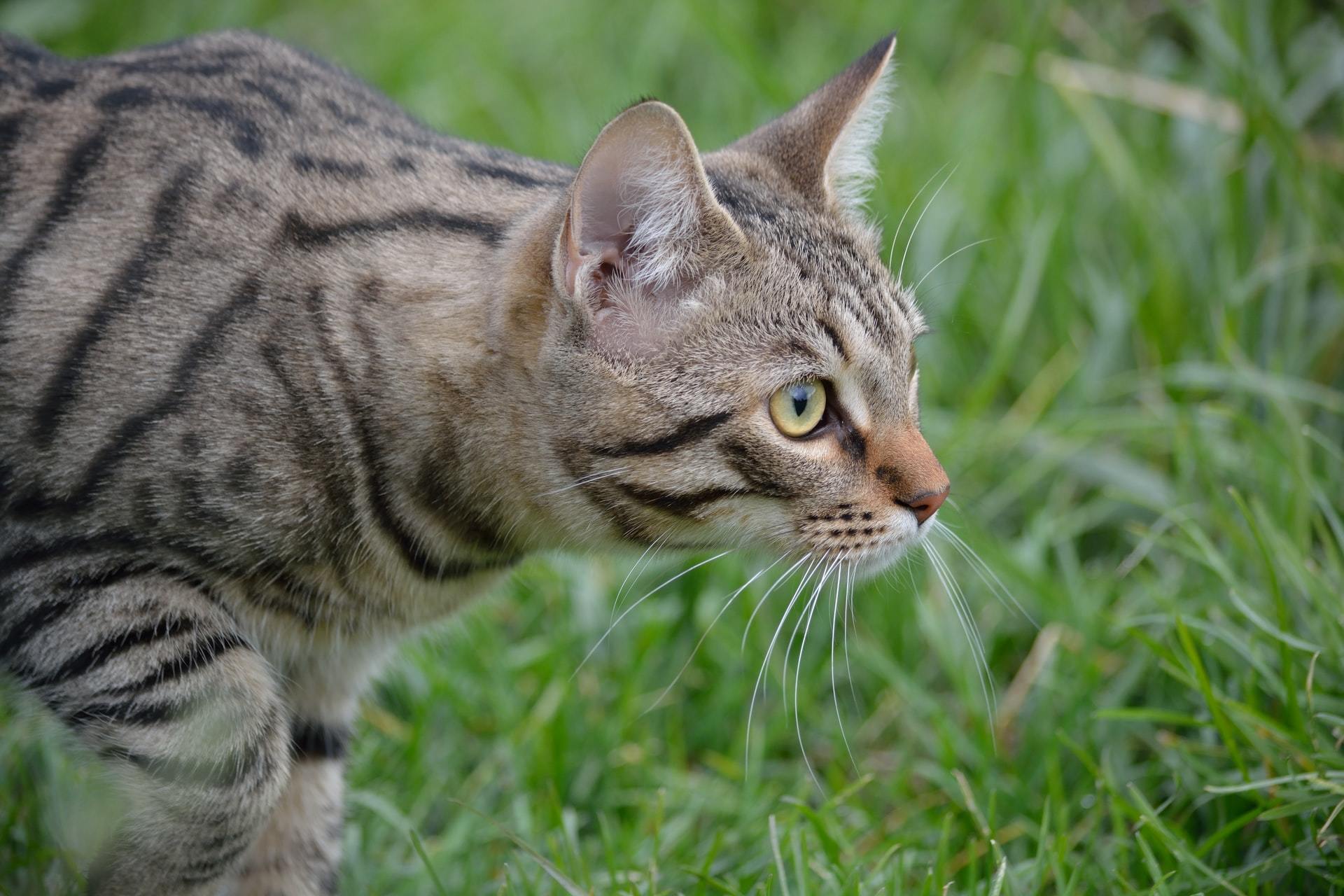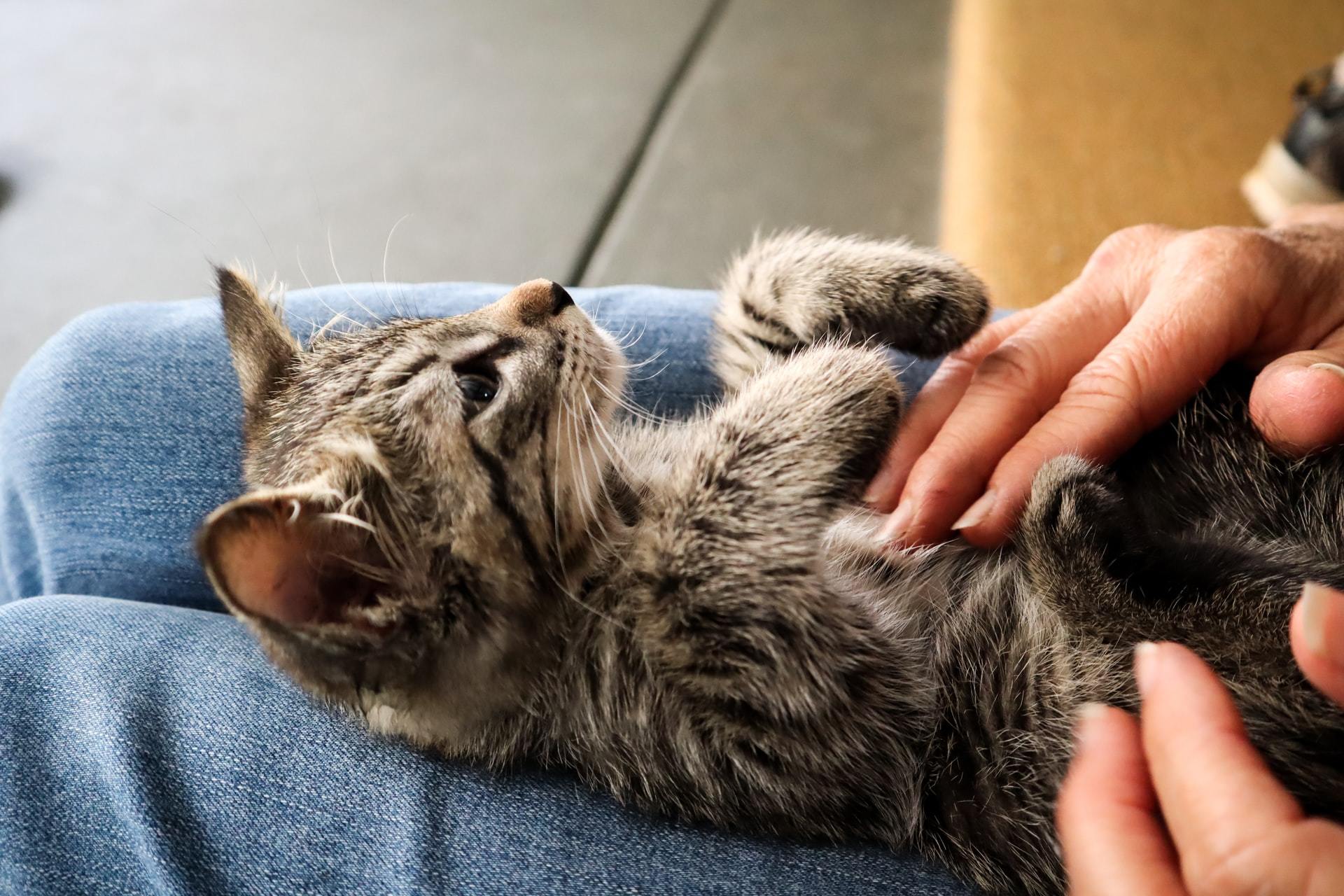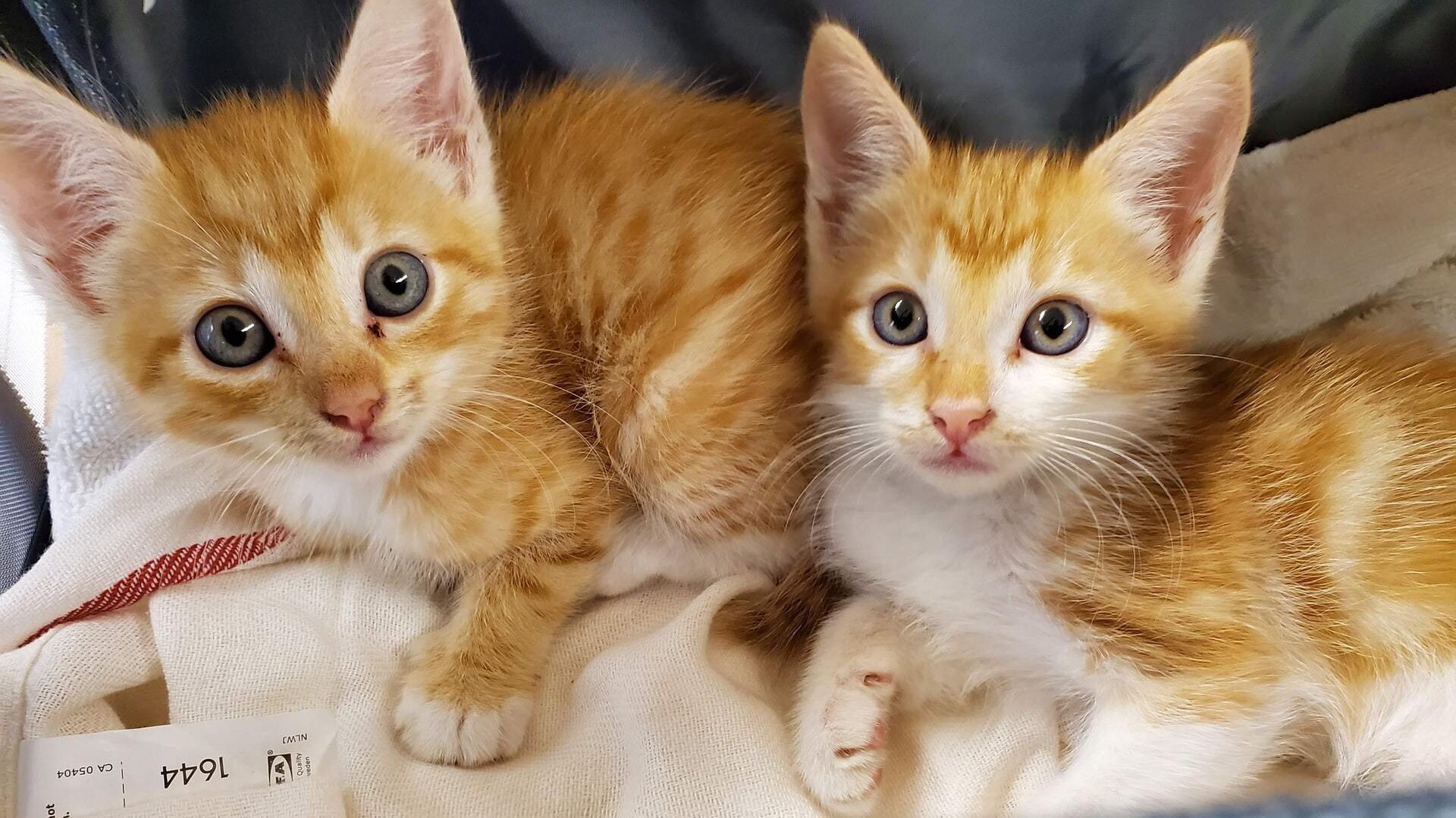Common Worms and Parasites Found in Cats

Although adult cats may not always show signs of illness when infected with internal parasites (worms and protozoa), if your feline family member is dealing with unexplained weight loss, chronic diarrhea, or vomiting, was recently adopted, or spends time outside, they may be dealing with internal parasites. Please keep reading to learn about the most common internal parasites in cats, the symptoms cats may experience, and how the infection is diagnosed and treated.
Are you concerned about your pet?
Book a video consultation with an experienced veterinarian within minutes.
- Professional vet advice online
- Low-cost video vet consultations
- Open 24 hours a day, 365 days a year
What are parasites?
Parasites are organisms that can live on the inside or the outside of your cat, as well as dogs, people, and essentially most animals on the planet. The three main categories of parasites are protozoa, helminths, and ectoparasites.
- Protozoa are microscopic organisms that consist of only one cell.
- Helminths are worms that can be flat, round, or thorny-headed.
- Ecto means outside, as in ‘outside the body’, so examples of ectoparasites are fleas, mites, lice, and ticks.
- Another group of parasites called trematodes or flukes can also infect cats.
How does my cat get worms?
The tendency for cats to become infected with specific parasites is directly related to the area of the country in which they live, if they are indoors or outdoors, whether they live with other animals, whether or not they are on parasite prevention, and of course, if they’ve seen a vet for testing and/or treatment.
Although intestinal parasites can affect cats of any age, it’s quite common for kittens to have parasites from birth. They can get these from their mother’s placenta and/or milk. Your vet should check your kitten’s stool sample for parasites at their first visit, as well as the subsequent 2-3 visits (every 3-4 weeks) when receiving their initial vaccines.
The stool is looked at under the microscope to check for roundworm eggs (Toxocara cati or less commonly Toxascaris leonina), tapeworm eggs (Dipylidium caninum), or protozoa (Giardia). Your kitten will likely also be ‘dewormed’ (given an oral liquid dewormer) at each of these visits. Parasites have different life cycles and aren’t always ‘shedding’, so they may not always be noted on your cat’s fecal exam even when present. Your kitten should start monthly heartworm/flea/tick prevention as soon as they are old enough (different medications are approved for varying ages, but typically start around 6-8 weeks of age).
If your cat is an outdoor cat, they’re more likely to get intestinal parasites from the soil or other animal’s feces, contaminated water, eating birds and mice, interaction with other animals, and exposure to ectoparasites such as fleas which can carry tapeworms. However, even indoor cats can have parasites. This can occur if your cat was never initially tested or treated for parasites as a kitten and has been building up a large worm burden without your knowledge.
What types of intestinal worms are common in cats?
In cats, the most common intestinal parasites are roundworms and tapeworms of the helminth category. We can also see the protozoa Giardia. If your cat defecates or vomits a long thin white worm, this may be a roundworm (less likely a hookworm, Ancylysoma spp or whipworm, Trichuris trichiura, though it is possible). If you see small white segments that look like rice on their behind, these are tapeworm segments. Giardia often causes diarrhea, but you cannot see it without a microscope, and even then, it can be challenging to find.
In parts of the world where Salmon are common (Southwestern US but also sometimes Northwestern US, Canada, and Siberia), cats may become infected with the “Salmon Poisoning Fluke”, Nanophyetus salmincola. This is a flat parasite that carries a bacteria which causes the cat to develop gastroenteritis. Cats that eat frogs, reptiles, or rodents may become infected with a different type of fluke, Alaria, found in North and South America, Europe, Australia, and Japan.

1. Roundworms (Ascariasis) in Cats
Adult cats, but even more so, kittens are commonly parasitized by roundworms. Of the two species that infect cats, Toxocara cati and Toxascaris leonina, Toxocara cati is the most common and can also cause disease in people (zoonotic).
How do cats get roundworms?
- Ingest eggs passed in the feces of infected animals
- Eat infected prey such as mice
- Or they may be passed from the mother cat (queen) to her kittens through her milk.
Unlike in puppies, kittens cannot be infected with roundworms before birth (transplacentally).
Adult cats typically have developed some resistance to infection with roundworms. Adult cats who are immunocompromised (female cats right before the birth of their kittens, feline leukemia positive cats, feline immunodeficiency virus positive cats, etc.), however, are more susceptible to roundworm infections.
Symptoms of Roundworms in Cats
- Poor growth
- Poor body condition
- Poor hair coat
- Pot-belly appearance
- Diarrhea with mucus
- Cough (infrequent and due to migration of immature worms in lung tissue)
In severe cases
- Anemia (low red blood cell count)
- Intestinal obstruction
- Death
In adult cats with roundworm infections, there are often no signs or symptoms noted.
How do I know if my cat has roundworms?
- Fecal floatation (microscopic evaluation of stool/feces and identification of roundworm eggs by your vet)
- Fecal Enzyme-Linked Immunosorbent Assay (ELISA) can detect T. cati infections when egg shedding is too low to be detected with a fecal floatation
- Roundworms may be seen in the vomit or stool of infected cats
Treatment Options for Cats with Roundworm Infections
Your veterinarian will discuss with you the best medication for deworming your feline friend and determine how often your cat/kitten should be dewormed to clear their roundworm infection.

2. Hookworms (Ancylostomiasis) in Cats
There are a few species of hookworms that can infect cats. One, in particular, Ancylostoma tubaeforme is very common and found worldwide. But Uncinaria stenocephala can also infect cats and is found in the northern United States.
Hookworms are also a zoonotic parasite (can infect people), as the larvae (immature worms) can penetrate unprotected skin when people walk barefoot on contaminated soil or sand. People may also become infected by eating improperly washed vegetables that may have contaminated soil on them.
How do hookworm infections occur in cats?
- Ingest the larvae in their environment (hookworm larvae are passed from the stool of infected animals)
- Eat infected host prey (rodents, cockroaches)
- Have skin penetration by the larvae
Unlike in puppies, kittens cannot be infected with hookworms before birth (transplacentally) or by nursing.
Symptoms of Hookworm Infection in Cats
- Pale gums due to anemia (low red blood cell count)
- Absent or decreased appetite
- Vomiting
- Bloody stool
- Loose tarry (black) stool
- Dehydration
- Constipation
In chronic (long-term) or severe infections the following symptoms may be noted:
- Anorexia (loss of appetite)
- Weight loss
- Weakness
- Sudden death
Often infected adult cats have no symptoms.
How do I know if my cat has hookworms?
- Fecal testing (microscopic evaluation and identification of hookworm eggs) by your veterinarian.
- PCR (Polymerase Chain Reaction) Assay – to detect hookworm DNA, is utilized less often but can detect hookworms and determine the species causing the infection.
Treatment of Hookworm Infections in Cats
Your vet will discuss with you the best medication for deworming your feline friend and determine how often your cat/kitten should be dewormed to clear their hookworm infection.
Severely anemic cats/kittens may need a blood transfusion and aggressive supportive therapy. Resistance of hookworms to multiple deworming medications is increasing, making it important to work closely with your vet to resolve a hookworm infection.

3. Tapeworms in Cats (Cestodes)
Multiple species of tapeworms can infect cats. Taenia taeniaeformis and Dipylidium caninum are the most common species of tapeworms that can infect cats. Fortunately, tapeworms rarely cause serious disease. Humans too can be infected with tapeworms, but not by the same species that infect cats.
How Tapeworms Infect Cats
- Eat infected fleas
- Eat infected mice or rats
Symptoms of Tapeworm Infections in Cats
- Often no symptoms
- Poor body condition (malnutrition)
- Waxing and waning appetite
- Poor quality fur coat
- Mild diarrhea
- Anal irritation/itch
Heavy or long-term tapeworm infestations may cause
- Intestinal obstruction
- Persistent diarrhea
- Persistent vomiting
Diagnosing Tapeworms in Cats
- Fecal testing (microscopic evaluation and identification of tapeworm eggs) performed by your vet
- PCR (Polymerase Chain Reaction) Assay on feces to detect tapeworm DNA
- Finding tapeworm segments in the fur around the anus or in the feces
How to Treat Tapeworms in Cats
Your vet will discuss with you the best medication for deworming your feline friend and determine how often your cat/kitten should be dewormed to clear their tapeworm infection.
Flea control is vital in the prevention and treatment of tapeworm infections in both indoor and outdoor cats.

4. Coccidia (Coccidiosis) in Cats
Coccidia are protozoal parasites that are commonly found to infect cats but more often cause infection and clinical signs of disease in kittens and adult cats with a weakened immune system.
How do cats develop Coccidiosis (infection with Coccidia)?
- Eat infective egg cysts from an environment contaminated with feces of an infected animal
Symptoms of Coccidia Infection in Cats
- Often no clinical signs of infection are seen
- Diarrhea (sometimes bloody) in severe cases
- Weight loss
- Dehydration
How do I know my cat has Coccidia?
- Fecal testing (microscopic evaluation and identification of the oocyst in feces) performed by your vet
- Along with clinical signs of disease
Treatment Options for Cats with Coccidia
Often cats do not require treatment as they can spontaneously resolve the infection. However, if immunocompromised or showing signs of illness, cats and kittens should be treated.
Sanitation of the environment is vital in preventing reinfection and spread of the disease to other kittens or immunocompromised adult cats.

5. Giardia in Cats (Giardiasis)
Giardiasis or active protozoal infection with Giardia is common in cats. This protozoal parasite can infect most mammals, including people. The infection rate of giardiasis is higher in kittens than in adult cats. It is not clear whether the species of Giardia that infects cats can infect people.
How Giardiasis (infection with giardia) Occurs in Cats
- Eat infective egg cysts from an environment contaminated with feces of an infected animal
Symptoms of Giardia in Cats
- Sometimes no clinical signs of infection are noted
- Poor appetite
- Long-term diarrhea (mucoid and fatty)
- Occasionally vomiting
- Diarrhea (sometimes bloody) in severe cases
- Weight loss
Diagnosis of Giardia in Cats
- Fecal testing with identification of Giardia cysts by your vet
- Fecal antigen testing for Giardia
As cats do not shed Giardia cysts in their stool constantly, multiple fecal tests may be needed for diagnosis.
Treatment Options for Cats with Giardia
Your vet will discuss with you the best medication(s) for clearing your feline friend’s giardiasis. However, because the Giardia cysts that your infected cat sheds may lead to reinfection, both frequent removal of stool from their litter box and bathing your cat may be necessary to remove cysts from their fur and to prevent reinfection.
As one cannot know if the Giardia species that their cat is infected with may infect people, it is important to wash your hands thoroughly after handling infected cats and their feces.

Other Diseases That Can be Mistaken for Intestinal Parasites in Cats
Panleukopenia virus, feline leukemia virus, feline immunodeficiency virus, and coronaviruses are the most common viral causes of gastrointestinal tract disease in cats.
How do I know if my cat has worms?
When you bring your cat to the vet, it’s helpful if you can bring a stool sample and even the worm(s) with you for identification purposes. Some cats don’t show any signs until they’re stressed in some way, or you may notice diarrhea or vomiting but not see any parasites. If your cat is losing weight but still eating well, parasites could be the cause (among other diseases). Parasites can build up in such large quantities that they can actually obstruct the intestinal tract. Some cats can become extremely dehydrated from vomiting and diarrhea. Do not let this go on without a vet exam and intervention.
Deworming Cats
There are several types of commonly used dewormers in veterinary medicine, depending on the type of parasite. There are oral, injectable, and topical treatments as well as preventions. It’s important to know what type of parasites your cat has before treating. Do not ever assume that just because your cat was ‘dewormed by the vet’ one time a year ago that they cannot possibly have any parasites. Even indoor cats who never go outside and don’t live with other animals can get parasites.
For example, you go to your friend’s house who has a dog that has fleas, you bring home a flea, and that flea immediately hones in on your cat as being a much more desirable host than you. This flea also happens to be carrying tapeworm, and suddenly a few weeks down the line, your cat is pooping out little white segments.
Can I get worms from my cat?
Please always keep in mind that people can get tapeworms and Giardia (though Giardia tends to be species-specific), so always wash your hands after handling your pets or their stool if you suspect that they are infected. Roundworm eggs that are accidentally consumed can migrate to various organs and cause damage (visceral larval migrans). Hookworm larvae can penetrate the skin and cause cutaneous larval migrans. Please remember to be conscious of anyone in the home who has a decreased immune system, including the very young and the elderly. We all know that kids do things like pet the cat and then stick their hands in their mouths!

What should I do if my cat has worms?
Ask your vet about the different options for your cat’s monthly parasite prevention. Because this is a hot topic in the veterinary field, there are constantly new products coming out. It is not advised that you purchase over-the-counter parasite control products unless your vet specifies a certain product. Some of these have been found to cause negative side effects, seizures, and even death. It is also very important that you never use a flea medication that is meant for dogs on your cat - this can also lead to severe side effects such as seizures and death.
Read More:
Parasites That Cause Diarrhea in Cats
How to Apply “Spot On” Medication to Your Dog or Cat
Need to speak with a veterinarian regarding intestinal parasites in cats or another condition?
Click here to schedule a video consult to speak to one of our vets. You can also download the FirstVet app from the Apple App Store and Google Play Stores.
More articles about Cat
Are you concerned about your pet?
Book a video consultation with an experienced veterinarian within minutes.